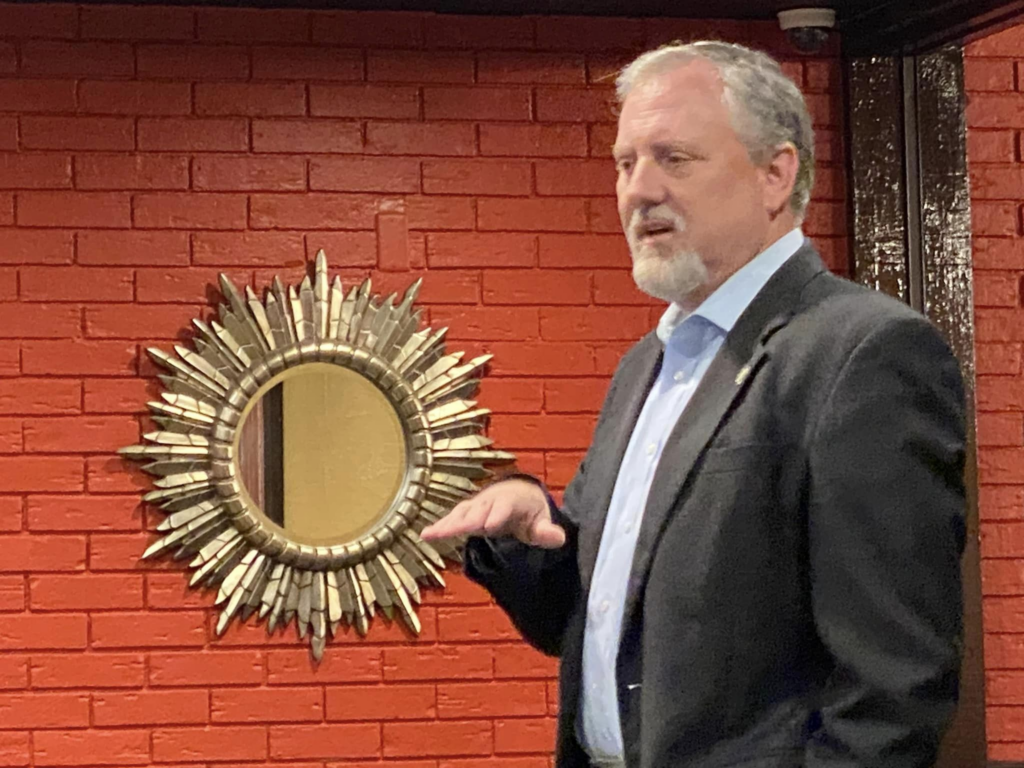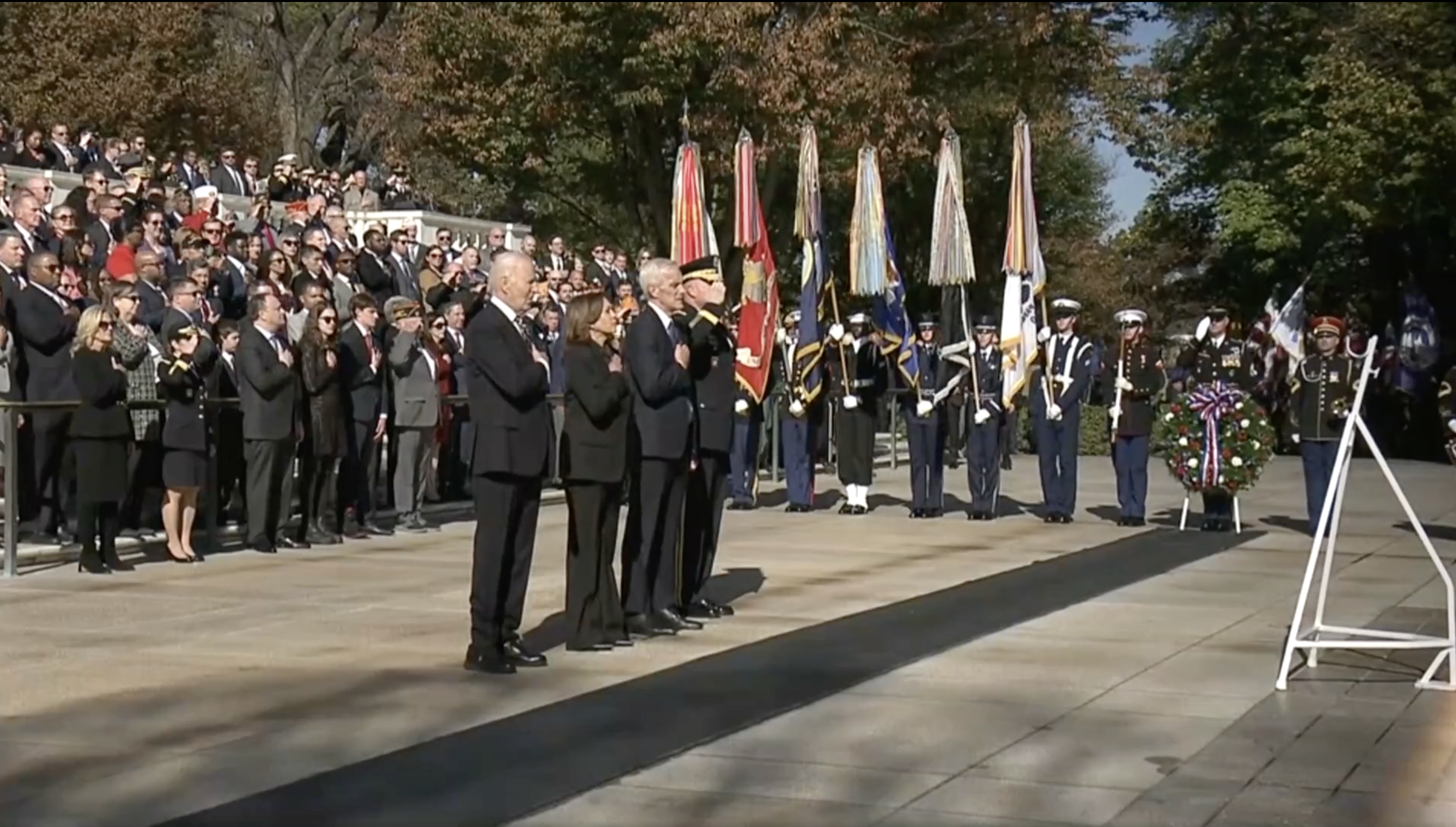On Saturday, Alabama Court of Criminal Appeals Judge Richard Minor addressed the Etowah County Republican breakfast meeting in Rainbow City.
Minor is serving his first term in the Alabama Court of Criminal Appeals.
“I am one of the five judges on the Court of Criminal Appeals,” Minor said.
Minor said his legal career began “As a clerk as a senior at Auburn for then-Attorney General Jeff Sessions.”
Minor then got his law degree from Cumberland Law School at Samford University.
He worked as a prosecutor in Tuscaloosa and Jefferson County before becoming an assistant district attorney in St Clair County. Minor was elected as District Attorney of St. Clair County.
Minor explained that when Alabama became a state, there were five judicial circuits and five judges.
“The five judges met together to comprise the Supreme Court to decide matters of law,” Minor said.
“Today, there are 41 circuits and Bessemer,” Minor said. “Judges were appointed by the Legislature until after Reconstruction then became elected.”
Minor explained that the first Supreme Court could consider points of law, not points of facts, as they ruled in the 1821 Fleming case, which was the first capital case before the Alabama Supreme Court.
The Court of Criminal Appeals is similar.
“If it is a question of fact, we can’t hear the case,” Minor said. The Criminal Court of Appeals can consider “just questions of law.”
The (Alabama) Supreme Court can consider appeals based on fact.
“The appellate rights we have today come from the legislature,” Minor said. “After Reconstruction, the Supreme Court went from 5 to 7 judges. In 1911 the Legislature created the Court of Appeals.
Minor said that the modern appellate court structure was set in 1969 by Governor Albert Brewer and the Legislature. There is a Court of Criminal Appeals and a Court of Civil Appeals with nine justices on the Supreme Court.
“Mary Windom is the presiding judge on the Court of Criminal Appeals,” Minor explained.
“Amy Lola Price was the first presiding judge of the Court of Criminal Appeals,” Minor said. “She was a judge before women could serve on a jury.”
“We handle between 1,100 and 1,600 appeals a year,” Minor said. “We are the fourth most active mid-level appeals court in the nation and the 11th most active appellate court in the country.”
Minor explained that 11 of the 18 appellate court judgeships will be on the ballot in 2024.
“I am on the ballot in March. So is Bill Cole,” Minor said. “There is an open seat on our court because Judge (Chris) McCool is running for Supreme Court.”
“Two individuals out of the AGs office are campaigning for the (open) seat,” Minor said.
Minor said that the Court of Criminal Appeals has such a large caseload because everyone convicted of a crime has a right to appeal in Alabama.
“We don’t have the right to deny them the right to appeal like the Supreme Court does,” Minor said. “We have a 4 or 5% reversal rate.”
“Sometimes the judge did something wrong,” Minor said. “Sometimes the sentencing is wrong.”
Minor explained that there is an issue when a judge finds a defendant guilty of both a major felony and a Class D felony in how the sentencing of that felony is allowed to be run.
Minor said it is important for defense counsels to raise an objection on a matter of law during the trial.
“If defense council doesn’t make an objection, there is nothing you can do about it,” Minor explained.
“Words mean something,” Minor said. “If the legislature put a certain word in a statute, it means something.”
“At the Court of Criminal Appeals, even though if I don’t like the law, we can’t change them,” Minor said. “At the Supreme Court, they can change them.”
An example of that is the year and a day rule. “That came over from England in the common law,” Minor explained. If a victim lives for a year and a day after the attack, the attacker cannot be charged with murder, but medical technology has changed a lot since then. “In 1986, the Supreme Court upheld the year and a day rule,” Minor continued.
In a more recent case, the Alabama Supreme Court struck down the year and a day rule and allowed a murder trial to occur.
“The Alabama Supreme Court can change it, but our court can’t,” Minor said.
Another example occurred during the COVID-19 pandemic. You have a right to face your accuser.
“The judge allowed the witnesses to wear masks,” Minor said. “It was a 3 to 2 decision, me and McCool,” voted that it violated the right to face your accusers principle.
“They only take about 3% of the cases that come out of the Court of Criminal Appeals,” Minor said of the Alabama Supreme Court. “They will normally take capital cases.”
“Eleven of the eighteen appellate judges will be on the ballot in March,” Minor said. “I hope that you will consider voting for me, Judge Cole, and also Judge McCool, who is running for Supreme Court.”
Minor was asked about soft-on-crime district attorneys who make unilateral decisions not to enforce certain Alabama laws.
“There are certain things I can and can’t say because of the rules for judges,” Minor said. “The district attorney is elected. The people of the county elected whoever that individual is. If that is what they want, then that is what they get. Things that are done here and in St. Clair County are done very differently than in other counties because that is how we are set up.”
“It does cause concern when someone has sworn an oath to follow the Constitution, both the U.S. and Alabama, and that individual says they won’t enforce a law that is on the books. If you want to change it, then run for the Legislature. Not enforcing it is bad law.”
“In February 2025, we will elect a new presiding judge because we will have a new judge,” Minor said. “It won’t change Mary Windom will continue to be our presiding judge. Our court is the only court that elects its presiding judge and the only one where prior judicial experience does not apply to seniority.”
Minor was asked if the Court of Criminal Appeals needed to be expanded.
“No, because we seem to be getting those cases out,” Minor answered. “I have three staff attorneys, and that is each judge.”
“We have a two-week voting period,” Minor said. “Typically, we will have 70 to 120 cases in that period to vote on. They are about to add judges at the circuit and district level where they are really needed.”
“Faith is a great part of my life,” Minor said. “Without my faith, I don’t think I could have dealt with some of the things I had to deal with as district attorney.”
Minor said that to him, family law is more difficult than criminal law.
“I don’t know how you deal with the people that you deal with,” Minor said. “Criminals understand they broke the law and got caught. Most of them are not mad. Some are.”
Minor said that in elections, he runs like he is losing because if you get complacent, your voters don’t come to the polls. Minor said that his preference is to run unopposed.
To connect with the author of this story or to comment, email brandonmreporter@gmail.com.
Related
Share via:













